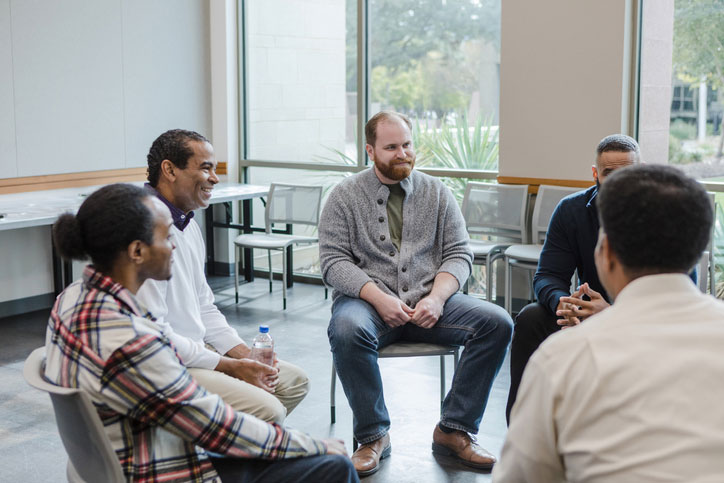Written by Halle Frost

For psychologists from marginalized backgrounds or those working closely with BIPOC and other underrepresented communities, access to culturally relevant resources can be a career game-changer. These supports empower practitioners to navigate unique professional challenges while enhancing culturally competent care for their clients. California, a state known for its diversity and progressive mental health initiatives, hosts a range of resources and organizations designed to uplift BIPOC and marginalized mental health professionals.
The Gap in Mental Health Resources for Minority Communities in California
Despite California’s reputation for mental health innovation, minority communities often face significant challenges in accessing quality mental health resources. Several systemic factors, from socioeconomic barriers to a shortage of culturally competent providers, contribute to these disparities.
Shortage of Culturally Competent Providers
For many communities, finding a therapist or counselor who understands their specific cultural background, language, and lived experience is challenging. The lack of BIPOC providers means that patients from diverse backgrounds often encounter difficulty finding a mental health professional who truly “gets” them. For example:
- Latinx Community: In California, only about 8% of psychologists identify as Hispanic or Latinx, despite Latinx individuals making up almost 40% of the state’s population. This shortage contributes to underutilization, as language barriers and lack of cultural understanding make some hesitant to seek care.
- Asian American and Pacific Islander (AAPI) Communities: Stigmatization of mental health within many AAPI communities compounds the problem. This stigma, combined with a lack of AAPI providers, can lead many in this population to forgo mental health services.
- Black and Indigenous Communities: The absence of providers from these communities often discourages individuals from seeking treatment, fearing misdiagnosis or bias. Historical distrust of medical systems can also deter these communities from seeking mental health services.
Language and Communication Barriers
California is home to a highly diverse population, including significant non-English-speaking populations. Without adequate resources for multilingual therapy services, limited English proficiency can prevent people from accessing care.
“Many mental health services lack translators, and even fewer offer direct access to therapists who speak languages like Spanish, Mandarin, Tagalog, or Vietnamese, despite these being widely spoken across the state.”
Additionally, therapeutic tools and assessments are often unavailable in languages other than English, leading to communication barriers that can affect diagnosis and treatment quality.
Socioeconomic Barriers from Underinsured to Low Accessibility
Even with insurance, the cost of therapy can be prohibitively high, particularly for BIPOC populations that experience disproportionate rates of poverty and underinsurance. Limited insurance coverage or high out-of-pocket costs deter many individuals from regularly attending therapy or seeking it at all.
Living in underserved or rural areas can further restrict access, as these regions have fewer clinics and mental health centers. Black, Latinx, and Indigenous populations in rural California, for instance, have fewer providers within reasonable travel distance, increasing the difficulty of consistent treatment.
Systemic Stigma and Historic Distrust
For many communities of color, historical mistreatment in medical and psychological fields fuels ongoing distrust. Events like the Tuskegee Syphilis Study, among other examples, left lasting impacts on the Black community’s perception of healthcare. Similarly, Indigenous populations have faced forced treatment and lack of consent within historical healthcare frameworks, contributing to a wariness of mainstream mental health services.
In many communities, particularly within Latinx, AAPI, and Black populations, mental health issues can carry a stigma that discourages individuals from seeking help. This stigma can delay or prevent engagement with mental health services and underscores the importance of culturally sensitive public health education on mental well-being.
High Rates of Trauma and PTSD in Marginalized Communities in California
Minority communities often face disproportionately high rates of trauma due to factors like economic instability, racial discrimination, immigration challenges, and community violence. These traumas can lead to PTSD, depression, anxiety, and other mental health conditions. Despite these elevated needs, access to trauma-informed care remains limited. BIPOC individuals, for example, are more likely to experience traumatic life events but often encounter barriers to appropriate treatment, including long wait times, high costs, and lack of accessible mental health facilities.
Lack of Representation in Training and Curriculum
Many mental health training programs across California do not sufficiently include culturally specific training that prepares future psychologists to work effectively with diverse populations. This gap in training means that even well-intentioned providers may lack the cultural sensitivity required to address unique challenges effectively, further alienating BIPOC patients.

Let’s Hear It For The Boys
In many cultures, men face significant pressure to embody strength, stoicism, and self-reliance, making vulnerability a challenging and often stigmatized act. For Black, Latinx, Indigenous, and Asian men, these expectations compound cultural stigmas already surrounding mental health.
“For example, in Latinx communities, the concept of machismo can imply that seeking help is a sign of weakness, especially for men, while in Black communities, there’s often a lingering distrust in healthcare due to historical and systemic discrimination.”
This creates an environment where men, already struggling with societal pressures, may find it harder to admit when they need mental health support. Additionally, within Asian and AAPI communities, mental health issues are sometimes seen as bringing dishonor or shame to the family. These overlapping stigmas mean that men in these communities are less likely to seek mental health support when they need it most, hindering the potential for timely intervention.
For men of color, especially those from lower-income backgrounds, economic challenges also serve as a substantial barrier to mental health care. With limited access to high-quality health coverage, mental health services can feel like an out-of-reach luxury rather than a basic need. Many marginalized men work in sectors that lack sufficient mental health coverage or time off, making regular appointments impractical. For those juggling multiple jobs to support families, taking time out to prioritize mental health is challenging, and underinsurance or high out-of-pocket costs only add to this difficulty. There’s also a shortage of male therapists, especially BIPOC male therapists, which may discourage men from seeking therapy if they’re more comfortable working with someone who shares or understands their cultural background. This combination of financial, logistical, and provider scarcity obstacles reinforces a cycle where mental health care remains inaccessible to many men from marginalized groups.
Trauma and PTSD Exposure
Men from marginalized groups in California are often disproportionately exposed to trauma and PTSD triggers. Black and Indigenous men, in particular, face some of the highest rates of community-based trauma and police violence, while Latinx immigrant men frequently confront the trauma associated with migration, economic instability, and the fear of deportation. AAPI men may carry the weight of intergenerational trauma, amplified by stereotypes that dismiss or minimize their mental health needs. Despite being more likely to encounter such traumatic experiences, the mental health support specifically catered to trauma recovery is lacking, especially for men of color. Accessing culturally competent trauma-informed care can feel almost impossible, which leaves many marginalized men to navigate complex mental health challenges without professional support. For these men, the ability to openly process trauma with a mental health professional who understands their unique cultural and social context is often out of reach.
Intersection with Sexual and Gender Identity
For LGBTQ+ men of color, mental health access is further complicated by the unique challenges tied to both racial and sexual identities. LGBTQ+ men from BIPOC communities often face discrimination within broader LGBTQ+ spaces, as well as from within their racial or ethnic communities, leaving them at a crossroads where safe, inclusive care is rare.
“These men frequently experience “minority stress,” a form of chronic stress related to discrimination that can lead to depression, anxiety, and other mental health issues.”
In California, there is a shortage of mental health services that address these intersecting identities, with few providers trained to understand the compounded discrimination that LGBTQ+ men of color face. This lack of affirming care leaves many navigating their mental health needs in isolation, reinforcing the importance of LGBTQ+ specific resources that cater to men who experience dual discrimination.
Community-Based and Peer-Led Programs

Community-based programs provide a crucial alternative to traditional therapy, offering a setting where men from marginalized backgrounds can connect and share experiences without the formal structure of a clinical environment. Peer-led groups are often organized through local nonprofits and designed to be culturally sensitive and community-centered. Programs such as the Black Men’s Health Project, Latinx men’s circles, and other cultural support networks provide spaces where shared experiences and collective healing are emphasized, often in more accessible ways than mainstream therapy. Many faith-based organizations have also begun to integrate mental health resources, especially for Black and Latinx men, who may find comfort and community support in these spiritual environments. These programs provide essential support by combining cultural familiarity with accessible resources, helping to bridge the gap for men who might not otherwise seek help.
1. Professional Associations and Networks
- California Black Psychologists Association (CBPA) - CBPA offers support, advocacy, and networking opportunities for Black psychologists, aiming to reduce racial health disparities and advance culturally aware practices. Membership benefits include workshops, research resources, and events tailored to the Black community.
- California Latino Psychological Association (CLPA) - CLPA connects Latinx psychologists and provides mentorship, training, and culturally relevant resources. CLPA’s regional chapters support professionals across California by fostering an inclusive community committed to mental health access and education.
- Asian American Psychological Association (AAPA) – California Chapter: AAPA serves as a vital resource for Asian American and Pacific Islander psychologists, promoting research, advocacy, and cultural awareness in mental health. With California’s extensive AAPI population, this network addresses specific cultural needs and fosters collaboration among professionals.
- Society of Indian Psychologists (SIP) – California Members: SIP supports Native American psychologists by sharing resources on indigenous mental health needs, historical trauma, and culturally respectful therapy practices. SIP also offers advocacy and training programs tailored to indigenous mental health challenges.
2. Culturally Responsive Training Programs
- The Wright Institute – Diversity and Inclusion Training: Based in California, The Wright Institute offers specialized programs focused on culturally informed psychology. These programs help BIPOC psychologists develop strategies to address mental health disparities within their communities.
- USC Race and Equity Center - The University of Southern California’s Race and Equity Center hosts workshops, seminars, and certificate programs focused on creating culturally competent mental health professionals. For BIPOC psychologists, it’s an invaluable resource for skill-building and community engagement.
3. Scholarships, Grants, and Financial Support in California
- Mental Health Services Act (MHSA) Stipend Program - This program provides stipends for graduate students from underrepresented backgrounds committed to serving in public mental health. It’s ideal for aspiring BIPOC psychologists who aim to support marginalized populations after licensure.
- California Psychological Association Foundation Diversity Award - CPA offers diversity scholarships to support graduate students and early-career psychologists from underrepresented backgrounds. This award promotes inclusivity in California’s mental health sector by supporting future professionals committed to equity.
4. Mental Health and Wellness Resources for BIPOC and Marginalized Psychologists
- Black Therapists Rock - A collective supporting the mental health needs of Black professionals, T4BL provides resources, peer support, and stress management tools for Black psychologists. The organization also offers free group therapy sessions and wellness events.
- National Queer & Trans Therapists of Color Network (NQTTCN) - With a significant presence in California, NQTTCN provides a healing space for queer and trans BIPOC therapists. Resources include mentorship, therapeutic networking, and workshops focused on navigating the intersections of race, gender, and sexuality in mental health work.
- California Association of Marriage and Family Therapists (CAMFT) – Cultural Humility Workshops: CAMFT hosts cultural humility and competency workshops specifically for BIPOC and marginalized therapists. These sessions explore boundary setting, countertransference, and other tools to navigate cross-cultural therapy dynamics.
5. Advocacy Groups and Policy Change
- Mental Health America of California (MHAC) - MHAC engages in advocacy and public policy initiatives to improve mental health access for marginalized groups. BIPOC psychologists can get involved in shaping legislation and advocating for equitable mental health resources in California communities.
- Latinx Mental Health Advocacy Groups - Organizations such as the National Alliance for Hispanic Health work on the frontlines of mental health advocacy, providing resources for Latinx psychologists committed to policy change and resource accessibility in California’s Latinx communities.
Supporting the Supporters
In California, the availability of mental health services for BIPOC therapists is crucial to the well-being of both the therapists themselves and the communities they serve. BIPOC therapists carry unique burdens—they provide vital culturally attuned support to marginalized communities while often navigating systemic inequities and personal identity-related stressors within their own profession. Unfortunately, many BIPOC therapists face barriers to finding culturally competent care for themselves, including a lack of BIPOC therapists in their own support networks and limited access to affordable, affirming services. By prioritizing mental health resources tailored to BIPOC therapists, California can foster a more resilient, supported, and diverse mental health workforce—one that is well-equipped to meet the needs of an increasingly diverse population. Investing in BIPOC mental health providers is not only essential for their personal wellness but also for the broader vision of equitable and accessible mental health care for all Californians.
